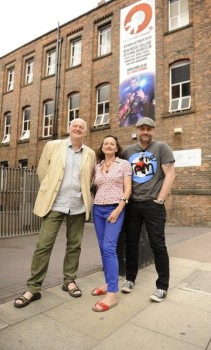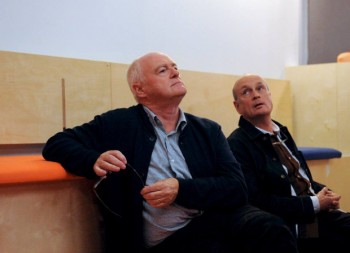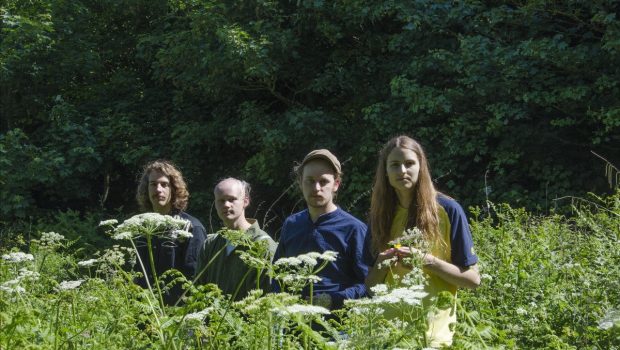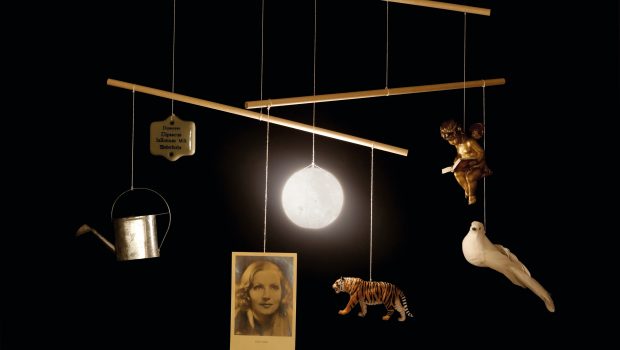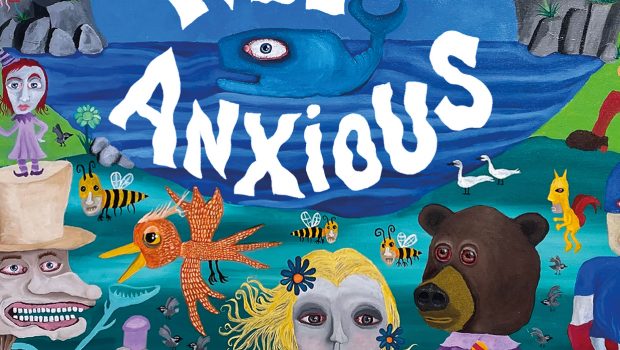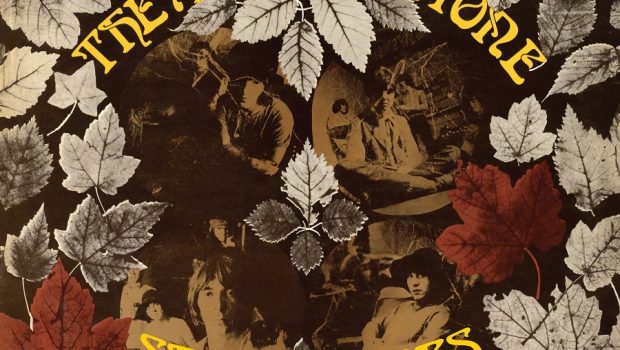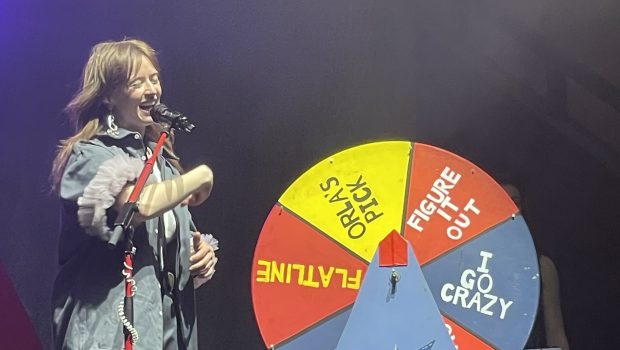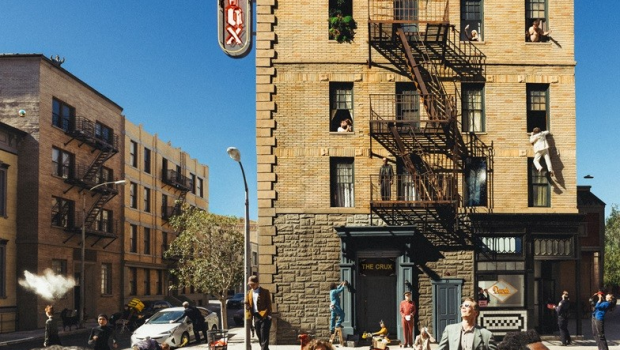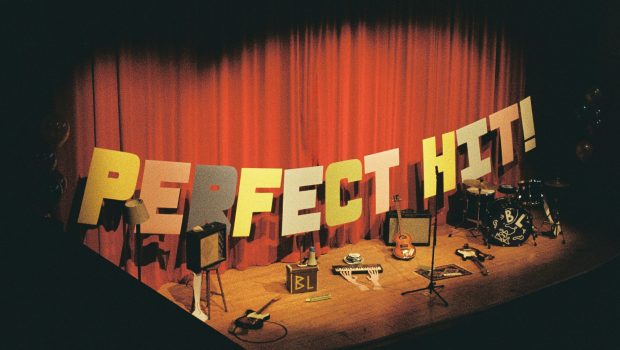This week BIMM officially opened in Manchester; a Hacienda inspired music school, with backing from the ex-boss of EMI. I chat to some of the key players behind the centre, to find out how they’re planning to deliver hot new talent into Manchester’s world-renowned creative scene.
With well-known schools in Dublin, London, Brighton and Bristol and an impressive alumni, including Two Door Cinema Club and Tom Odell, BIMM’s fifth centre has been given a hallowed spot in the heart of Manchester. BIMM Board member and former EMI Chief, Tony Wadsworth CBE, explains why the city was an obvious choice for the new campus,
“Manchester was a no brainer because it’s got such an incredibly rich culture, history and a real vibe to it. It wasn’t any contest as to where the next school should be. Manchester is an incredibly vibrant city, it seemed the right place to situate it.”
BIMM students are taught by industry pro’s still working in the sector. This means they’re receiving the latest insider knowledge, career advice and networks to compete in the music business. With an impressive 26 year career at EMI, Tony see’s the industry links as a key feature in BIMM’s offer,
“BIMM’s got a fantastic connection with the industry; I think that’s really important for the students. It’s great to be able to improve in your craft and get better at playing, but also at the end of it, you want to be able to make a living making music for the rest of your life.”
Vaseema Hamilton, principal of BIMM Brighton, Bristol and Manchester adds,
“The students will be working with future collaborators and other professionals that they will probably work with for the rest of their careers… We’ve got KT Tunstall coming in, in the next few weeks, our first A-List guest for Manchester. There’s already 50 students signed up.”
She explains that as well as the all-important technique, pupils are taught about the business side of the rapidly changing industry, “That’s one part of the curriculum that changes and is being reviewed on an annual basis.”
Vaseema’s also eager for the rest of Manchester’s buzzing creative community to become actively involved with the school, “Our vision is that it’s going to be a hub. There’s events in Manchester that bring together people from the creative industries and I want this space to be a place to host those talks and get collaborative projects going with musicians and other types of creatives.”
The £3.5million custom-fitted campus on Great Marlbrough Street is decked out with the latest technologies and state-of-the-art equipment to teach accredited courses at Diploma and Degree level. On the outside, the BIMM building is a classic Mancunian redbrick, mill-style affair. Vaseema reckons there was just one team fit for the job of designing the inside,
“We felt that there was only one design company that we could possibly approach and that was Ben Kelly, because of his heritage and links with the Manchester music scene.”
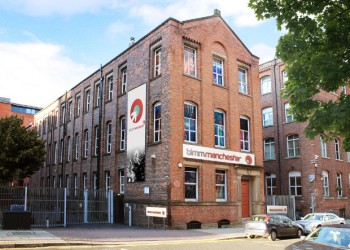 You may remember Ben from such iconic Manchester locations as the Hacienda, Fac 251, and Dry Bar, “It’s been an honour and a privilege working with BIMM. Hopefully we’ve injected character and life into the project. There’s an honesty in what we’ve done and hopefully the groove factor as well. We wanted it to be bright, vibrant and a nod back to the Hacienda; there are some rather large stripes on the wall that go all the way up the floors of the building. All the bits of memorabilia are from the incredible past of Manchester.”
You may remember Ben from such iconic Manchester locations as the Hacienda, Fac 251, and Dry Bar, “It’s been an honour and a privilege working with BIMM. Hopefully we’ve injected character and life into the project. There’s an honesty in what we’ve done and hopefully the groove factor as well. We wanted it to be bright, vibrant and a nod back to the Hacienda; there are some rather large stripes on the wall that go all the way up the floors of the building. All the bits of memorabilia are from the incredible past of Manchester.”
The creative industries are one of the UK’s fastest growing sectors and the biggest in Europe. To keep this up, the industry needs an on-going supply of fresh and super skilled talent. But Tony agrees that many young people with creative ambitions have to overcome many hurdles before they ‘make it’,
“The greatest barrier is not having the connections and the training. In the past, so much of it has been down to luck, privilege and connections. What institutions like BIMM do is level the playing field, so that you can make the connections.
Training is really important because it’s very competitive. There used to be a very old fashioned attitude that ‘it’s just rock and roll and nobody can teach you how to play rock and roll’; well actually, people can teach you how to do it better than you do it at the moment. It doesn’t mean that it’s not going to be fun, have attitude, be leftfield or creative. Technique is valued in every other parts of industry, why shouldn’t it be valued in the creative industries?”
Tony’s thoughts on the difficulties young people face in getting a foot in the door, are from his real, personal experiences. He explains that becoming a boss at one of the biggest labels in the world, boiled down to the fact that was he was once a rubbish rock star from Greater Manchester,
“I graduated in Economics and that turned out to be irrelevant eventually. At the time I wanted to be in a band, so I was in one for 2 years. Because I wasn’t trained at somewhere like BIMM. I wasn’t good enough. When that broke up I decided that I just wanted to work in record labels. I came from Bolton so I didn’t know anybody; I started at the very, very, very, very bottom and gradually worked my way up.
I didn’t ever think of it as a career, but I knew the only thing that I was interested in working in was music. Eventually everybody else falls out the way and you find yourself running EMI, because they are not as keen as you are.”
Through the enormous power of the internet, the creative industries has quickly seen a massive shift in the way artists can take a ‘D.I.Y’ , low-cost approach to their own marketing and distribution.
Vaseema is quick to point out that virtual side of things is high up on BIMM’s teaching agenda, “When we started BIMM 12 years ago there wasn’t much in the curriculum for business around the digital arena, but now that’s hugely up front.”
Tony recognises the impact the web has had in catapulting unknowns into the limelight and questions if the traditional record company and musician relationship is even needed, “Everyone’s not got a big record deal. The advantage today, is that you don’t really need that to get started and to get your music out there. One of the things that BIMM is able to do for the musicians is to teach them how to be a small business in their own right.”
Vaseema adds, “They need to be brave, entrepreneurial, flexible and agile in their thinking. We emphasise that from the moment they arrive.”
But, kids are switching on their TV on a Saturday night and seeing people catapulted to instant fame. Simon Cowell has created an alternative, viable and highly accessible career path in the eyes of many budding stars. But Tony reckons it’s nothing new,
“There’s always been a part of our business that has not been real or artistic. When ‘Sgt Pepper’ came out it wasn’t Number One, ‘Sound of Music’ was. ‘Please Release Me’ by Engelbert Humperdinck was Number One when ‘Strawberry Fields Forever’ was Number Two.
It’s always been the case that you have great artistic music and you have ‘other stuff’ and I see that whole reality, talent show thing as being the ‘other stuff’.”
Yet, Tony’s not a fan of the fast–track route to stardom, “It might work for some people, but it doesn’t work for me. It’s more about the TV industry that it is about the music industry. Yes some artists have come through, but if you think about the number of artists that don’t, then you could argue that those artists, the good ones, would have come through anyway.”
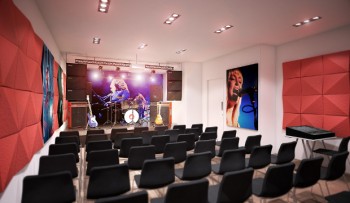 Knowing a thing or two about the industry, Tony is a keen advocate for up and coming musical superstars and continues to back organisations such as the Brit School, who work closely with new talent,
Knowing a thing or two about the industry, Tony is a keen advocate for up and coming musical superstars and continues to back organisations such as the Brit School, who work closely with new talent,
“The thing that got me into the industry was being passionately into music, nothing else. I never actually thought that I would get to where I got to.
If you’ve been working in the industry for 30 years, then hopefully you’ve learnt something and it would be a real shame to knock it on the head and go and play golf. I’d rather use that experience and the knowledge. Not be some doddering old idiot who stands around saying ‘it used to be great and now it’s not’. Because actually it is better than it’s ever been; there are so many opportunities.
I just find music very, very exciting and it’s great to still be a part of it”
With a typical Mancunian swagger, the city proudly boasts the second largest creative sector in the UK. It’s predicted that over the next 10 years the industry could provide a huge 23,000 new jobs across the region. BIMM joins an impressive Manchester roster of specialist schools, colleges, academies and national charities dedicated to honing the craft and skills of the city’s next big creative things.
The next challenges are intervention and prevention. How do we encourage young people and their influencers that their creative ambitions don’t have to remain as aspirations? Then, once their spat out the other side and all creative industry ‘work-ready’, how do we stop them from being swept away by the London brain drain?
